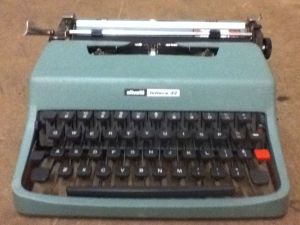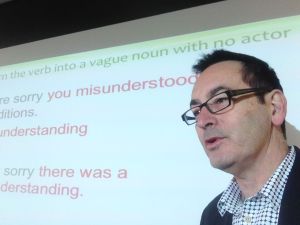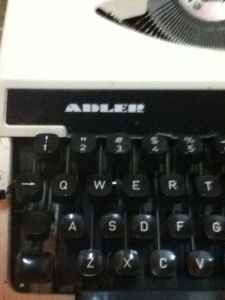Little Writing Trick #2 – when nouns can save your arse
Here’s a little writing trick about how nouns can help you out of touchy situations – how non-blame nouns can help you make a “blameless apology” and sound “diplomatic”.
Generally the active voice is better because it:
- clearly identifies the “actor”
- is more concise, and
- sounds more vigorous.
However, sometimes you want to “vague it up”. You don’t want to point the finger of blame at anyone.
Let’s just say your client made a mistake because the client misunderstood instructions. It was the client’s fault – but you don’t want to say that.
If you wrote:
We are sorry you misunderstood the instructions.
that is in active voice: “YOU” misunderstood the instructions – Subject Verb Object.
This active construction makes it clear that the client (YOU) is the one to blame – the one who misunderstood the instructions.
That’s where NOUNS come in very handy!
Here’s how you harness the no-blame noun!
Find the verb – turn it into a no-blame noun.
verb = misunderstood – change to the noun: misunderstanding
We are sorry for the misunderstanding.
OR
We are sorry there was a misunderstanding.
Can you see how there is no actor – just a vague, diplomatic NOUN.
As a young man working as a political speech writer I learned from more experienced colleagues how to tweak voice and turn verbs into nouns to sound more diplomatic. If you are interested – I can share plenty of little writing tricks with you!
Here’s another example:
Instead of writing:
We are sorry YOU got confused
OR
We are sorry we confused you.
1. find the verb – confused
2. turn it into a no-blame noun – confusion
We are sorry for the confusion.
You see – there is this general confusion – but you are not saying who is to blame for “doing” the confusing or getting confused.
Anyway, I better sign off – Bob Dylan lyrics about confusion are now stuck in my head.
There’s too much confusion. Can’t get no relief.
(Recognise the song? Several other artists covered this classic)
Oh dear – I have digressed and I have taken you of track. My fault!
I apologise – I digressed.
OR should I use vague non-blame nouns?
Apologies for the digression!
And if you think the writers in your organisation can benefit from more little writing tricks – please contact me and we can discuss: tonybiancotti@ozemail.com.au
———————-
If you enjoyed this post – Let’s connect:
If you found this post interesting you can follow me and connect with me.
I blog about fun pop culture stuff as well as more serious business communication tips.
I’ve disciplined my self to check ALL my different communication platforms twice a day – as part of my Check-in Ritual.
https://twitter.com/tonybiancotti
@tonybiancotti
Linked In – under Tony Biancotti
Cheers,
Tony







Pingback: Little Writing Trick #3 – use visual language | efangelist